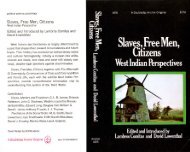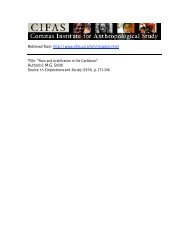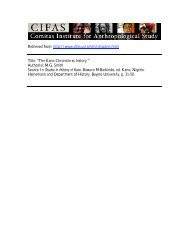e - CIFAS
e - CIFAS
e - CIFAS
You also want an ePaper? Increase the reach of your titles
YUMPU automatically turns print PDFs into web optimized ePapers that Google loves.
'0 GOVERNMENT IN ZAZZAU<br />
transfonn it into authority. This summarizes the history of the<br />
Briti5h monarchy. Similarly, to the extent that the scope and<br />
nature of authority is incompletely or imprecisely defined, or is<br />
extended beyond its defined limits, power is exercised, and the<br />
structure or office concerned has political characteristics and<br />
significance. This proposition in turn summarizes the development<br />
of the British Parliament. Just as there can be no such thing as<br />
uncons'tituted authority, 80 there can be no such thing as an exhaU8tive<br />
constitution of power.<br />
(fJ The Problem ofForce<br />
Power has been defined as the ability to act effectively on persons<br />
orthings, authority as a delegated and limited right to do so. Force<br />
differs from powerand authority which are bothabstract conditions<br />
and capacities in the concreteness of its reference. Force denotes<br />
physical effort or strength, and in the 8Qciological context, human,<br />
especially masculine, strength. The abstract use of this term, force,<br />
is a reification of this physical capacity to inflict physical harm.<br />
The concrete use of the terms authority and power is an instance<br />
of the opposite sort of reification.<br />
Authority and power may both be associated with the control or<br />
application of force, but these relations win di:fferentiate authority<br />
and power, and in any society, their associations with force will<br />
differ by degrees and contexts and possibly also by organs or types<br />
offorce. Thus force is in part legally constituted and administered,<br />
but never entirely so. In its legally constituted form, force is applied<br />
within the society through the agency of administration to<br />
provide the population with certain essential conditions of physical<br />
security, to prevent the use ofviolence in political competition, and<br />
to protect the unit from external attack. Under regimes characterized<br />
by overlapping political and administrative systems, force may<br />
also be applied authoritatively by political leaders to eliminate their<br />
rivals and disperse opposition. Normally, however, such use of<br />
force is more or less political, and its authorization in terms ofthe<br />
prevailing conceptions of legitimacy depends largely on the extent<br />
to which identification of political and administrative functions<br />
has been accepted as itself legitimate. In its external aspect and<br />
application, as in war, the administration of force proceeds under<br />
authority, while decisions to employ it are political in content and<br />
form. In tenns of its source, therefore, the force used in war is<br />
THE NATURE OF GOVERNMENT 31<br />
normally constitutional, although in terms of its target it is<br />
normally illegitimate.<br />
To regard force as the source of power is to reverse the order of<br />
their relation. Power, defined as the capacity to act effectively on<br />
persons or things, has many components or forms of expression,<br />
and force is one of these. In the abstract, force is the capacity to<br />
in:llict harm, and for its exercise clearly presupposes the power to<br />
ACCumulate, co-ordinate, and direct supportj less abstractly, force<br />
is the manifest infliction of haem, and as such is a concrete demonstration<br />
of the power which it presupposes. The crucial feature of<br />
centralized administrative systems is never the simple concentration<br />
of force within them, but their monopoly of constitutional<br />
force; this is in essence a monopoly of the rights to authorize the<br />
use of force and to restrain its use by others through the employment<br />
ofa greater concentration of legitimate force. This monopoly<br />
ofauthorized force in twn depends on public consensus about the<br />
legitimacy of the governmental system. In other words, it is not the<br />
means of exercising force as such which fonos the direct content<br />
of the monopoly held by centralized systems of government, but<br />
the right to control and employ force within the unit concerned.<br />
The degree and character of the centralization ofan administrative<br />
system corresponds therefore to the consensus prevailing about<br />
its monopoly rights to control force within the area, and these<br />
rights express its authority. Thus the term 'centralization' properly<br />
Iefers to the administrative aspect of a governmental system or<br />
structure. since governmental action defined in tenos of authority<br />
is administrative in character and foem. Consequently in central~<br />
ized systems rules define the conditions under which force may be<br />
legitimately employed, and particular branches of administration,<br />
suchasthejudiciary, police, army, intelligencesenrice, etc., are more<br />
orless concerned with the applicati.on and administration of force.<br />
Since force is the ultimate expression of power in conflict,<br />
supremacy of power implies supremacy offorce, and is thus locally<br />
uncontrollable. FOT this reason, no set of rules can perpetually<br />
guarantee, control, or define the exercise of supreme power. The<br />
incalculability of such power ultimately corresponds to its freedom<br />
to exercise force outside ofthe strictly authorized framework. Such<br />
possibilities are inherent in all political systems and therefore in all<br />
governments, since the political components of government are<br />
relations based on, expressed, and mediated intermsof power, and





